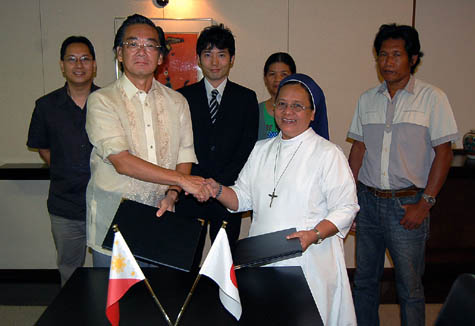
Japanese Ambassador Makoto Katsura congratulates Sr. Celerina Zabala of KAPPIA Network Inc., after signing the grant contract for “The Project for the Construction of Muscovado Processing Facility in the Municipality of Bangued, Abra on March 11, 2011 at the Embassy of Japan. The ceremony was witnessed by the representatives from KAPPIA and the Embassy of Japan. |
Japanese Ambassador Makoto Katsura and KAPPIA Network, Inc., Executive Director Sr. Celerina Zabala signed the grant contract for “The Project for the Construction of Muscovado Processing Facility in the Municipality of Bangued, Abra”on March 11, 2011 at the Embassy of Japan. The project, amounting to US$ 81,911 (approximately 3.5 million pesos), is funded through the Grant Assistance for Grassroots Human Security Projects (GGP).
The economy of Abra Province is based on the agricultural sector where the primary products are rice, corn and sugarcane. Not all farms in Abra, however, have irrigation systems, and in those areas where agricultural water supply is scarce, farmers tend to plant sugarcane that can be grown with comparably a little amount of water, instead of rice or corn. The challenge for the sugarcane farmers is to find a way of raising their income which is now pegged at around 2,500 pesos per month. The average income of 2,500 pesos is not enough for sustaining a family of six, the average number of a household in the area.
Currently, the provincial government is promoting muscovado sugar under the One Town One Product (OTOP) program. Muscovado sugar is known as healthy sugar and is said to have a large potential market in the Philippines. The government aims to increase the production of value-added muscovado sugar to raise the average income of the sugarcane farmers. A local NGO, KAPPIA Network, has engaged in the production and sales of muscovado sugar, in cooperation with the government. KAPPIA Network is composed of the local sugarcane farmers and succeeded in making muscovado sugar the primary product of the area.
On the other hand, compared to the Visayas region where reliable equipment is available, farmers in Abra still use crude, inefficient technology in processing muscovado. They still employ carabaos to extract the juice for making the sugar. As a result, their production of muscovado sugar in 2009 is just 8.81 metric tons. This is far short of the potential demand of the whole Philippines that is estimated to be more than 100 metric tons.
Under these circumstances, KAPPIA Network sought assistance from the Japanese Embassy. With the grant provided, KAPPIA Network is going to construct a Muscovado Processing Facility and purchase necessary machinery such as a cane crusher, a cane juice filtering system, etc, for the purpose of improving the productivity. After the project is completed and the facility starts its operation, the production of muscovado sugar by KAPPIA Network is expected to increase from the 2009 level of 8.81 metric tons to around 150 metric tons. This can also contribute to income-raising of the sugarcane farmers in the Municipality of Bangued as well as in adjacent municipalities in Abra.
Japan, as the top donor of the official development assistance for the Philippines, launched GGP in the country in 1989 for the purpose of reducing poverty and helping various communities engaged in grassroots activities. As of early March 2011, 440 grassroots projects funded by GGP – ranging from roughly 1 to 4 million pesos – have been implemented by NGOs, local government units and other non-profit organizations. The total grant for these projects so far amounts to US$19,745,127. It is expected that this project will further contribute to strengthening the friendly ties between the peoples of Japan and the Philippines as well as fostering a strategic partnership between the two countries towards the future.
Japanese Version


